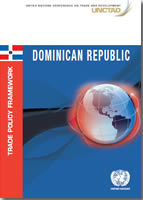
International trade is an engine for economic growth that can contribute to promoting sustainable development. It can be a powerful force for creating jobs, fostering efficient use of resources, stimulating entrepreneurship and ultimately lifting people out of poverty.
Many developing countries, though, have limited capacity to analyse the relationship between trade, productive capacity and employment, assess policy options and formulate and implement adequate national trade policy frameworks. This hampers their ability to make full use of the transformative power of trade for development.
UNCTAD’s Trade Policy Framework Reviews help countries in a systematic, comprehensive and strategic manner.
The Government of the Dominican Republic, through the Ministry of Industry and Trade and with the assistance of UNCTAD, initiated this trade policy framework study. This report is the result of an analysis developed in close communication and collaboration with a wide range of actors in the national government, the business sector and civil society.
This document aims to make a contribution to the understanding of the Dominican Republic’s trade policy framework, the instruments it uses, its implications and limitations in relation to the challenges posed by the international environment and those presented in the National Development Strategy.
Simultaneously, it presents alternative reforms in order to address these deficits. The policy reforms required for productive development and to boost international competitiveness, although they are out of the reach of this document, are also brought into the discussion, as they will enable the further development of a robust export offer.
Chapters II and III analyse the context in which trade takes place in the Dominican Republic, describing national development objectives and economic performance.
Chapter IV deals with trade performance indicators, emphasising the analysis of export dynamism and restructuring patterns.
Chapter V describes instruments related to trade policy, emphasising the dual character of the Dominican framework and the role of trade agreements. It discusses regimes related to the export of goods and services, emphasising new services with relevant implications for international trade, which have shown a remarkable performance in recent years and suffer from lack of information and recognition.
Chapter VI examines the institutional framework related to production and competitiveness, and the one related to trade.
Chapter VII summarises the conclusions and findings from the analysis and contains recommendations regarding lines of action.
Annex 1 sets out lines of action and proposals for their implementation.
Annex 2 summarises, in table format, all proposals for trade policy reform included in this report. It also suggests a non-exhaustive list of local actors who should be involved in promoting new actions and indicators to measure future progress in the Dominican Republic’s trade policy reform.



